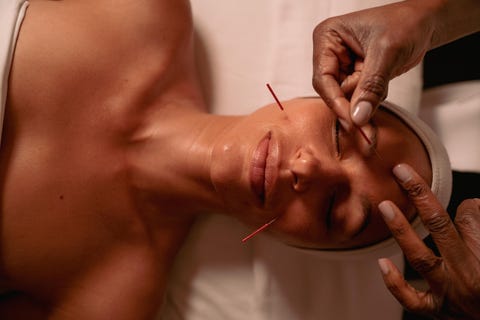For those who haven’t tried it, the thought of acupuncture can be daunting. Newbies, perhaps working off a misunderstanding of Eastern medicine, tend to imagine lots of needles and expensive treatments. Moreover, many may be skeptical about the myriad issues acupuncture is said to aid with.
Admittedly, I was one of those skeptics. In March, I was formally diagnosed with polycystic ovarian syndrome (PCOS)—a chronic (and quite common) hormonal disorder. In my case, I suffer from prolonged periods. My doctor gave me advice about how to manage my atypical menstrual cycle, but it all felt so generic: I was told to ramp up my exercise routine and was given information on foods to eat and avoid, along with a list of supplements to take. But the more I read about PCOS and the more I spoke with others who were diagnosed, the more I realized no case was the same. Some women were not getting their periods at all; meanwhile, mine lasted 15-plus days with continuous bleeding. How could the treatment be the same for all of us?
That’s when I decided to look into a more personalized course of treatment. Enter: acupuncture.
“Most people assume acupuncture is just for pain management, because there have been so many studies on how acupuncture improves joint pain, muscular pain, and arthritis,” Pema Chen, LAC, DACM [Doctor of Acupuncture and Chinese Medicine], a third-generation practitioner of traditional Chinese medicine, tells BAZAAR.com. “However, acupuncture works to regulate imbalances in the body, including on a hormonal level.”
I decided to explore TCM, aware that it was a more multifaceted approach encompassing acupuncture, herbal medicine, nutrition, and exercise. I knew there must be a reason the 3,000-year-old practice of acupuncture had been gaining traction in our wellness-obsessed world.
Finding Personalized Treatment
“If there’s one thing I’ve learned in my practice, it’s that there is no such thing as the typical PCOS patient,” Lisa Mascall, DACM, tells me. “Some may present with irregular cycles and have resistance to insulin—therefore difficulty losing weight—but have clear, beautiful skin. Yet another may come with regular cycles, severe acne, and renegade hair growth.” PCOS patients can have one or a combination of these symptoms, so the approach to treatment must be highly specialized.
In Mascall’s clinic, she does a comprehensive initial consultation that gets to the core of the symptoms that make up each patient’s own version of PCOS. The treatment—which includes acupuncture and herbal medicine—is then directed toward the patient’s needs. Mascall worked as a physical therapist before switching careers after growing dissatisfied with Western medicine, which she felt was not treating the body as a whole. Now, her work merges what she learned from modern Western medicine with ancient Eastern traditional medicine and philosophies.
She says some of the misconceptions about acupuncture and TCM are starting to disappear. “Often, people think that if acupuncture actually worked, modern medicine would know about it and be using it, but modern medicine is beginning to see the benefits of acupuncture and herbal medicine,” Mascall says. “One of the ways you see this is with the ‘integrative medicine’ centers popping up everywhere.” Unfamiliar? “Integrative medicine is a combination of what we know as medicine (commonly called Western medicine) and acupuncture (Eastern medicine),” Mascall says, adding that, “Together, they can work quite beautifully.”
Treating My PCOS Through Acupuncture
To begin my journey, I booked an experience at ORA, an acupuncture oasis founded by entrepreneur Kimberly Ross in 2020, whose mission is to bring traditional techniques of TCM into a spa-like experience.
I visited the Upper East Side location in New York City (there are also spots downtown and in Bridgehampton). It really did feel like a luxury spa, with a calming aesthetic worlds away from the loud city streets. My appointment was the last of the day, at 7 p.m.—the perfect way to end a long day at work. I started with a 65-minute introductory session, which at ORA costs $145. (ORA accepts HSA insurance; many other acupuncture practices accept insurance as well.)
The personalization was immediately apparent, too, with focused time spent on my medical history, discussing my goals, as well as what to expect. “We see people individually. A customized treatment, whether it is acupuncture, herbs, or a combination of Chinese medicine methods, is created for each person’s unique needs and conditions,” Gabriel Sher, director of acupuncture at ORA, says. Many traditional acupuncturists, like Dr. Shaobai Wang, “start each session with a tongue reading, feel the patient’s pulse, and then get to the history of their problem,” in order to determine the course of treatment.
I entered the room at ORA afraid of needles—but left feeling the opposite. As I laid on my stomach with the lower half of my body covered by a warm blanket, the acupuncturist gingerly inserted hair-thin needles into my back. I felt a quick, tingly sensation that dissipated in seconds. The needles were so tiny that they bent to the touch—I could barely feel them. I could feel them even less on areas with thicker skin, such as the belly and back.
In understanding how exactly PCOS can be treated with acupuncture, Sher explained how the practice can boost blood flow to reproductive organs, balance hormones, regulate menstrual cycles, and normalize the systems that regulate ovulation—all especially helpful for women with PCOS. The purpose of the needles is to stimulate points to promote the body’s natural healing processes.
The post-acupuncture experience was subtle but noticeable. I felt relaxed, but more so confident that I had found an experience that took my diagnosis seriously and was going to create a personalized treatment for me. I will continue seeking TCM treatment, as it was recommended to go for six to 10 sessions for my PCOS.
Combining Acupuncture with Herbal Medicine
It’s important to note that TCM goes beyond acupuncture, with a deep focus on herbal medicine. Think of acupuncture and herbal medicine as a package deal, coming together to correct the root dysfunction in your body. “When approaching such a complex syndrome as PCOS, a multifaceted approach is the only way to address it successfully,” Mascall says. “In general, when someone says acupuncture, they really are just talking about the insertion of tiny needles in various points throughout the body, but some forget, or even do not know, that herbal medicine is a huge part of this ancient practice.”
As it turns out, my original doctor’s advice was in line with what the TCM practitioners say too: Exercise and nutrition also play a part. (Remember: a multifaceted approach.) “For many women with PCOS, making sure your BMI is at a healthy level with a nutritious diet and exercise are important,” Chen says. “Insulin resistance is a frequent issue for people who have PCOS. It can be exacerbated by an overconsumption of sugar. Exercise will also help reduce stress hormones, which can suppress menstruation.”
Sher also describes the “famous formula in Chinese medicine,” an herbal blend used for irregular cycles. Called Yin Qiao San, it’s said to help regulate hormones and blood flow, plus balance out emotions. (Note that herbs are not prescribed to women who are on fertility treatments. Before taking any herbs, make sure you notify your acting physician.)
When asked why acupuncture is finally becoming mainstream in the U.S., Wang says simply, “It’s effective.” With practices in New York City and Long Island, Wang came to the United States 31 years ago as a visiting professor at Columbia University Medical School. “Traditional Chinese medicine has been practiced in China for more than three thousand years. In fact, in Eastern medicine, TCM is not an ‘alternative’ but a default course of treatment.”
I’ll need to do six to 10 sessions to know what kind of impact TCM can actually have on an overlong period. But what I know right now is that the whole process has given me hope. It has made me feel like someone is taking my diagnosis seriously. And it’s giving me new confidence to know that I have a plan created just for me—with three millennia of practice to back it up.
Disclaimer: Reach out to your doctor when seeking treatment for PCOS.
This content is created and maintained by a third party, and imported onto this page to help users provide their email addresses. You may be able to find more information about this and similar content at piano.io
Acupuncture Gave Me Hope After My PCOS Diagnosis
Newspaper Updates PH



0 comentários :
Post a Comment